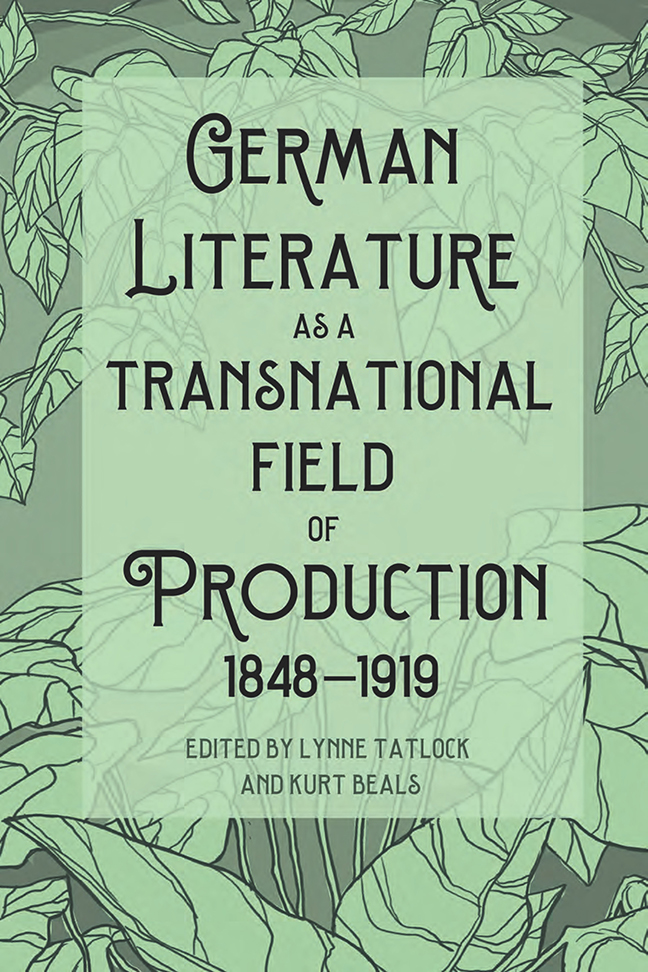Book contents
- Frontmatter
- Contents
- Acknowledgments
- Introduction: A Transnational Literary Field in the Age of Nationalism
- 1 The Passion of Johannes Scherr: Historiography as Trauma
- 2 Between Integration and Differentiation: On the Relationship between German and Austrian Literature in the Second Half of the Nineteenth Century
- 3 Reading Stifter in America
- 4 Travel Writing and Transnational Marketing: How Ida Pfeiffer brought the World to Austria and Beyond
- 5 Ernst Brausewetter's Meisternovellen Deutscher Frauen (1897–98): Gender, Genre, and (Inter)National Aspiration
- 6 Arbiter of Nation? The Strange Case of Hans Müller-Casenov's The Humour of Germany (1892/1893)
- 7 Visualizing the End: Nation, Empire, and Neo-Roman Mimesis in Keller and Fontane
- 8 Eurocentric Cosmopolitanism in Thomas Mann's Buddenbrooks
- 9 European Peace from a Transatlantic Perspective: Victor Hugo and Bertha von Suttner
- 10 Hermann Graf Keyserling and Gu Hongming’s Ethics of World Culture: Confucianism, Monarchism, and Anti-Colonialism
- 11 Constructing Symphonic Worlds: Gustav Mahler, Weltliteratur, and the Musical Program
- 12 The Garb of National Literature: Transnational Identities and the Early Twentieth-Century Schriftstreit
- 13 From European Symbolism to German Gesture: The International and Transnational Nationalism of Stefan George's Blätter für die Kunst
- 14 Canon Fire: Dada's Attack on National Literature
- Selected Bibliography
- Contributors
- Index
10 - Hermann Graf Keyserling and Gu Hongming’s Ethics of World Culture: Confucianism, Monarchism, and Anti-Colonialism
Published online by Cambridge University Press: 10 January 2024
- Frontmatter
- Contents
- Acknowledgments
- Introduction: A Transnational Literary Field in the Age of Nationalism
- 1 The Passion of Johannes Scherr: Historiography as Trauma
- 2 Between Integration and Differentiation: On the Relationship between German and Austrian Literature in the Second Half of the Nineteenth Century
- 3 Reading Stifter in America
- 4 Travel Writing and Transnational Marketing: How Ida Pfeiffer brought the World to Austria and Beyond
- 5 Ernst Brausewetter's Meisternovellen Deutscher Frauen (1897–98): Gender, Genre, and (Inter)National Aspiration
- 6 Arbiter of Nation? The Strange Case of Hans Müller-Casenov's The Humour of Germany (1892/1893)
- 7 Visualizing the End: Nation, Empire, and Neo-Roman Mimesis in Keller and Fontane
- 8 Eurocentric Cosmopolitanism in Thomas Mann's Buddenbrooks
- 9 European Peace from a Transatlantic Perspective: Victor Hugo and Bertha von Suttner
- 10 Hermann Graf Keyserling and Gu Hongming’s Ethics of World Culture: Confucianism, Monarchism, and Anti-Colonialism
- 11 Constructing Symphonic Worlds: Gustav Mahler, Weltliteratur, and the Musical Program
- 12 The Garb of National Literature: Transnational Identities and the Early Twentieth-Century Schriftstreit
- 13 From European Symbolism to German Gesture: The International and Transnational Nationalism of Stefan George's Blätter für die Kunst
- 14 Canon Fire: Dada's Attack on National Literature
- Selected Bibliography
- Contributors
- Index
Summary
When the German Estonian aristocrat Hermann Graf Keyserling traveled around the world (1911–12), he arrived in Hong Kong from India in March 1912, toward the end of China's 1911 Revolution (1911– 12). About a month earlier, on February 12, the last Emperor of the Qing Dynasty, Aisin-Gioro Puyi (爱新觉罗溥仪), had abdicated, putting an end to China's long tradition of monarchism. Despite the political upheavals, Keyserling spent several months in China and traveled from the southern tip of the country all the way to the north to visit Beijing. Even amidst this political turbulence and the nationalist movement against monarchy in China, Keyserling highly praised the Qing nobles whom he met in China and confidently touted Chinese Confucianism, the state philosophy of the dynasty, as a future utopian vision for life and society throughout the world. Keyserling's predilection for Confucianism, however, is not so much a philosophical or intellectual position as a political one. It contains a strong justification of monarchism as an ideal form of government, which corresponds to his own aristocratic background and reflects his nostalgia for the dwindling monarchism in Europe.
The source of Keyserling's Confucian enthusiasm was probably the Chinese Malay thinker Gu Hongming (辜鸿铭, 1857–1928, also known as Ku Hung-ming), whom Keyserling met in Beijing. Keyserling was immediately impressed with Gu's personality and agreed with his political and philosophical views, as documented in Keyserling's hugely popular Das Reisetagebuch eines Philosophen (1918; The Travel Diary of a Philosopher, 1925). While Gu shared Keyserling's anti-liberal monarchism and his conservative critique of modernity, Gu's background differed considerably from Keyserling’s. Gu grew up as a colonial subject of Chinese descent in British Malaya and received his education in Europe, mostly in the United Kingdom. However, Gu later denounced British colonialism and moved to China to reclaim his cultural and national belonging. Gu's defense of Confucianism thus contains an anti-colonial impetus, even though he was dismissed by his contemporary Chinese revolutionaries as a conservative. Compared to Keyserling, Gu more sharply critiques Western imperialism in China and rejects technological modernity, for example, in his book The Story of a Chinese Oxford Movement: An Essay in Political and Social Criticism in China (1910), which had just been published in English when Keyserling visited China.
- Type
- Chapter
- Information
- Publisher: Boydell & BrewerPrint publication year: 2023

